Empowering the Future Through Vocational Education & Skill Development
The Counsel for Vocational Education & Skill Development (CVESD) is dedicated to empowering individuals by providing high-quality vocational education and skill training. We aim to bridge the skill gap and create a workforce that meets industry standards.
Our Mission
To enhance and support vocational training initiatives that equip individuals with industry-relevant skills, enabling them to achieve sustainable employment and career growth.
Our Vision
To establish a strong skill development ecosystem that fosters innovation, entrepreneurship, and employment opportunities.
Women Empowerment through Skill Development
Women’s economic participation and empowerment are fundamental to strengthening women’s rights and enabling them to have control over their lives and exert influence in society. The economic empowerment of women is a prerequisite for sustainable development. Gender equality and empowered women are catalysts for multiplying development efforts.
The Government of India has enacted various rules and regulations within the constitutional framework to improve female representation in different professions. Currently, a majority of the female workforce in India is unskilled. Skill is the bridge between job and workforce. Skill development is key to improving employability and income-earning opportunities for women and enhancing sustainable rural development and livelihoods. Social outcomes are reflected in indicators of income inequality and poverty. Employment outcomes are reflected by indicators of employment rates, unemployment, youth not in school, and earnings.
Self-Employment through Skill-Building
Vocational training programmes are introduced to enhance livelihood opportunities for women who are at a disadvantageous position and have scant exposure to technical skills and knowledge. At present, the capacity of Skill Development in India is around 3.1 million persons per year. The 11th Five Year Plan envisions an increase in that capacity to 15 million annually. India has a target of creating 500 million skilled workers by 2022. Thus, there is a need for increasing the capacity of skill development programmes.
Proposed Initiatives
Policies such as improving access to skill development by creating more seats for women, gender mainstreaming of content and delivery of training, and the use of digital platforms for women’s empowerment should be streamlined to improve the productivity of the economy and participation of women. It will provide a roadmap for skill development and help the government to catalyse the process. Some of the proposed beginnings can be:
- Additional Training and Apprenticeship Seats: To improve access to skill development, we need to create facilities by setting additional training and apprenticeship seats, which also includes increasing the pool of women trainers. Mechanisms to provide certification to trainers should be resilient, and new institutes for training women trainers should be promoted.
- Need for Special Delivery Mechanisms: The need for gender mainstreaming of training is vital. To bridge the gap, there is a need for special delivery mechanisms such as mobile training units, flexible afternoon batches with local needs-based training. It should also envision the incorporation of women-related issues such as safe training environments, employment of women trainers, equity in remuneration, and complaint redress mechanisms.
- Momentum of Digital India in Skill Development: There is a need to incorporate ICT (Information and Communication Technology) for providing skill development solutions. It should focus on promoting internet or mobile-based platforms that connect skilled women and employers. It should also emphasise women re-entering the workforce after a break or those affected by migration.
Successful Methods to Retain Girls and Women in the Workforce
- Introduce trainees to role models in respective sectors.
- Provide more hands-on opportunities.
- Collect and display testimonials so that trainees can relate and take more interest in the programme.
- Fetch candidates rapidly in under-served populations.
- Develop a comprehensive equity plan to identify and address discriminatory practices and artificial barriers to girls’ enrolment.
Key Areas of Focus
- Vocational Education: Industry-aligned training programs for diverse sectors.
- Skill Development: Hands-on training to enhance employability and productivity.
- Training & Certification: Recognized certifications that validate acquired skills.
- Entrepreneurship Support: Encouraging self-employment and start-up initiatives.
- Industry Collaboration: Partnerships with leading organizations for better career opportunities.
Why Choose CVESD?
- Registered under Ministry of MSME Government of India.
- Recognized and valued by top employers.
- Comprehensive training programs tailored to industry needs.
- Certified courses to enhance career opportunities.
- Affordable and accessible learning opportunities.

